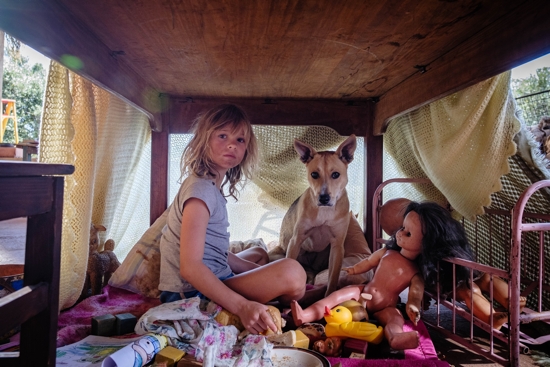
“Don’t Let’s Go to the Dogs Tonight” (Sony Pictures Classics) is writer-director Embeth Davidtz’s adaptation of Alexandra Fuller’s 2001 memoir of her childhood in Zimbabwe (formerly Rhodesia). The respectful and evocative drama recounts its protagonist’s slowly dawning recognition of racial inequality in her homeland.
Set during Rhodesia’s civil war and the lead-up to the 1980 election that put Robert Mugabe in power, the film retains the calm tone of its source material. Thus the script omits any mention of the difficulties Fuller’s family endured after they were forced to move from their struggling farm when property was redistributed to the natives who had suffered under the previous regime.
Instead we get the impressionistic memories of Fuller’s stand-in, a tomboyish and perpetually unbathed 8-year-old nicknamed Bobo (Lexi Venter). Based on what she, in her innocence, can comprehend, life on the homestead initially seems idyllic, though hardscrabble.
Davidtz, who also plays Bobo’s mother Nicola, effectively ramps up the growing paranoia as white colonists face violent repercussions. But this comes at the expense of showing how Bobo gains wisdom.
Nicola is a police officer who sleeps with her rifle and is always on the lookout for cattle rustlers. She says that if she doesn’t have a gun, she’ll fight for her property with her bare hands.
Bobo’s father Tim (Rob van Vuuren) is in the army and seldom home. By this time in the struggle, as the movie shows, whites were having to make even the most routine trips in heavily guarded convoys.
Bobo gets occasional adult guidance from a duo of servants, Sarah (Zikhona Bali) and Jacob (Fumani N. Shilubana). Yet Bobo’s parents have inculcated her with their own racism so deeply that her connection with the two is usually strained.
“First you have to watch out for the terrorists,” Bobo says in her opening narration. “So you’re not supposed to talk to Africans about anything, just in case they’re terrorists, or they’re mates with one.”
She also believes, “Africans don’t have last names. They just have first names.”
Bobo’s grandmother (Judy Ditchfield) is fully vested in the colonial delusions. “Are we racists?” she replies to Bobo. “Certainly not! Some people are, but we’re not.”
“We have breeding,” she tells Bobo, “which is better than having money.”
Asking her mother, “Am I African?” Bobo is told no. “Is it because we don’t have brown skin?” Nicola sighs, “It’s complicated.”
For Bobo and her family, there’s no violent denouement, only displacement. Bobo eventually has a vision of Sarah as a queen, but it seems like an insight obtained too late.
The film contains mature themes, including racism, two scenes involving sexual menace, fleeting profanities and some rough language. The OSV News classification is A-III – adults. The Motion Picture Association rating is R — restricted. Under 17 requires accompanying parent or adult guardian.



